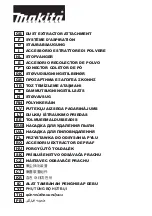
13 ENGLISH
Model HR004G
Work mode
Vibration
emission
Uncertainty (K) Applicable
standard
Hammer
drilling into
concrete
(a
h, HD
)
6.5 m/s
2
1.5 m/s
2
EN60745-2-6
Hammer
drilling into
concrete with
DX14 (a
h, HD
)
6.0 m/s
2
1.5 m/s
2
EN60745-2-6
Chiselling func-
tion with side
grip (a
h, Cheq
)
7.5 m/s
2
1.5 m/s
2
EN60745-2-6
Drilling into
metal (a
h, D
)
2.5 m/s
2
1.5 m/s
2
EN60745-2-1
NOTE:
The declared vibration total value(s) has been
measured in accordance with a standard test method
and may be used for comparing one tool with another.
NOTE:
The declared vibration total value(s) may also
be used in a preliminary assessment of exposure.
WARNING:
The vibration emission during
actual use of the power tool can differ from the
declared value(s) depending on the ways in which
the tool is used especially what kind of workpiece
is processed.
WARNING:
Be sure to identify safety mea-
sures to protect the operator that are based on an
estimation of exposure in the actual conditions of
use (taking account of all parts of the operating
cycle such as the times when the tool is switched
off and when it is running idle in addition to the
trigger time).
EC Declaration of Conformity
For European countries only
The EC declaration of conformity is included as Annex A
to this instruction manual.
SAFETY WARNINGS
General power tool safety warnings
WARNING:
Read all safety warnings, instruc-
tions, illustrations and specifications provided
with this power tool.
Failure to follow all instructions
listed below may result in electric shock, fire and/or
serious injury.
Save all warnings and instruc-
tions for future reference.
The term "power tool" in the warnings refers to your
mains-operated (corded) power tool or battery-operated
(cordless) power tool.
CORDLESS ROTARY HAMMER
SAFETY WARNINGS
1.
Wear ear protectors.
Exposure to noise can
cause hearing loss.
2.
Use auxiliary handle(s), if supplied with the
tool.
Loss of control can cause personal injury.
3.
Hold power tool by insulated gripping sur-
faces, when performing an operation where
the cutting accessory may contact hidden
wiring.
Cutting accessory contacting a "live"
wire may make exposed metal parts of the power
tool "live" and could give the operator an electric
shock.
4.
Wear a hard hat (safety helmet), safety glasses
and/or face shield. Ordinary eye or sun glasses
are NOT safety glasses. It is also highly recom-
mended that you wear a dust mask and thickly
padded gloves.
5.
Be sure the bit is secured in place before
operation.
6.
Under normal operation, the tool is designed
to produce vibration. The screws can come
loose easily, causing a breakdown or accident.
Check tightness of screws carefully before
operation.
7.
In cold weather or when the tool has not been
used for a long time, let the tool warm up for
a while by operating it under no load. This
will loosen up the lubrication. Without proper
warm-up, hammering operation is difficult.
8.
Always be sure you have a firm footing. Be
sure no one is below when using the tool in
high locations.
9.
Hold the tool firmly with both hands.
10.
Keep hands away from moving parts.
11.
Do not leave the tool running. Operate the tool
only when hand-held.
12.
Do not point the tool at any one in the area
when operating. The bit could fly out and
injure someone seriously.
13.
Do not touch the bit, parts close to the bit, or
workpiece immediately after operation; they
may be extremely hot and could burn your
skin.
14.
Some material contains chemicals which may
be toxic. Take caution to prevent dust inhala-
tion and skin contact. Follow material supplier
safety data.
15.
Always be sure that the tool is switched
off and the battery cartridge and the bit are
removed before handing the tool to other
person.
16.
Before operation, make sure that there is no
buried object such as electric pipe, water pipe
or gas pipe in the working area.
Otherwise, the
drill bit/chisel may touch them, resulting an electric
shock, electrical leakage or gas leak.
17.
Do not operate the tool at no-load
unnecessarily.
SAVE THESE INSTRUCTIONS.
Summary of Contents for 131301
Page 2: ...2 3 1 1 Fig 1 1 2 Fig 2 1 Fig 3 1 Fig 4 1 Fig 5 1 A B Fig 6 1 2 3 Fig 7 2 ...
Page 3: ...1 2 3 4 Fig 8 1 2 Fig 9 1 Fig 10 1 Fig 11 1 Fig 12 Fig 13 1 2 3 Fig 14 3 ...
Page 4: ...1 2 Fig 15 1 Fig 16 1 A Fig 17 1 Fig 18 1 Fig 19 1 2 Fig 20 1 Fig 21 4 ...
Page 5: ...1 2 Fig 22 1 Fig 23 3 4 1 2 Fig 24 Fig 25 1 Fig 26 1 Fig 27 5 ...
Page 6: ...2 1 Fig 28 1 Fig 29 1 2 Fig 30 Fig 31 Fig 32 Fig 33 Fig 34 1 2 Fig 35 6 ...
Page 7: ...1 2 Fig 36 2 1 Fig 37 1 Fig 38 1 Fig 39 Fig 40 Fig 41 Fig 42 Fig 43 7 ...
Page 8: ...1 Fig 44 3 1 4 2 Fig 45 1 2 3 Fig 46 1 Fig 47 1 2 1 2 Fig 48 Fig 49 8 ...
Page 9: ...1 Fig 50 1 2 Fig 51 1 Fig 52 1 Fig 53 1 2 1 2 Fig 54 1 Fig 55 9 ...
Page 10: ...2 1 Fig 56 1 2 Fig 57 1 2 Fig 58 10 ...
Page 178: ...178 ...
Page 179: ...179 ...














































